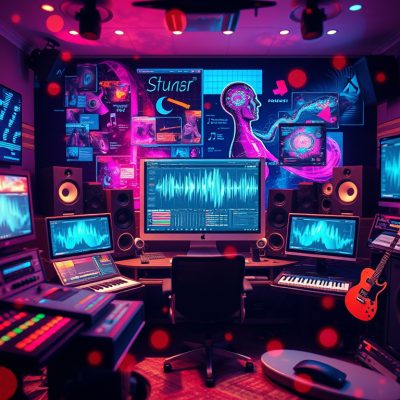AI in Music: Artistic Promise or Social Peril?
 Temps de lecture/Reading time : 3 minutes
Temps de lecture/Reading time : 3 minutes
In this article, I will attempt to provide an overview of artificial intelligence applied to music, while sharing my personal perspective on its impacts and challenges.
A musical revolution underway
Artificial intelligence (AI) has crept into many fields, and music is no exception. Tools like AIVA, Boomy, Amper Music, and Suno now allow the generation of musical compositions in seconds. Whether it’s to create a soundtrack, an ambient soundscape, or even an entire song, AI has become an accessible creative partner for everyone.
Far from replacing humans, it acts as a catalyst for creativity. Musicians can now compose faster, test multiple arrangements, or draw inspiration from new musical structures. A beatmaker can ask an AI to provide an instrumental base, which they then refine. A songwriter can use language models to create lyrics or get out of a creative block.
This technological upheaval opens the way for a true democratization of music creation. The tools are often free or inexpensive, accessible via simple browsers, with no prior musical skill required. Anyone can explore, experiment, and play with sounds and styles.
But this ease raises questions. What about originality? What value does music created without direct human intervention hold? AI opens the door to massive music production, but also risks homogenization if misused. It is thus up to humans, once again, to use it wisely—as a tool, not an end in itself.
Personally, I’m not very drawn to these tools, as my artistic approach has always been guided by the desire to create deeply unique and personal music.
Musicians and AI: toward a new creative era
For musicians, AI can be seen as a unique opportunity for renewal. It does not replace talent, vision, or emotion—it extends them. By allowing rapid prototyping of ideas, exploring unfamiliar genres, or collaborating with a virtual entity capable of musical dialogue, AI enriches the creative process.
Some artists go further by integrating AI as a “digital muse” in their artistic process. The exchange becomes hybrid: the human proposes an intention, the AI reacts, suggests, transforms. This is called co-creation.
But any tool can be misused. AI also facilitates plagiarism, copying, and counterfeiting. Vocal clones of famous artists circulate, musical deepfakes imitate styles or voices to produce artificial tracks sometimes indistinguishable from the original. The phenomenon of “forgers” evolves: they use AI to multiply their capabilities.
This raises deep questions about authenticity. Who is the author of a song created 80% by AI but guided by a human? How can copyright be protected in this new context? Can a prompt be patented?
In this changing world, the musician becomes more than ever a guide, a curator, a conductor of ideas. Their value lies in their ability to create meaning, emotion, and to wield modern tools to bring out something unique.
AI and human work: the tipping point
Music is an emblematic example, but it is only the precursor of a much broader change: the automation of many human activities by AI. This is not just a replacement of tools, but a genuine redefinition of skills and professions.
In music, producers, arrangers, sound technicians, even singers may see their work altered, simplified, or replaced. But this phenomenon already affects many other sectors: journalism, design, finance, administration, even programming.
The central question becomes: what do we do when most human tasks can be done by machines? Are we ready to live in a society where work is no longer the norm or the foundation of social identity?
This can be seen as a threat but also as an opportunity. Freed from forced labor, we could reinvest time into fulfilling activities: education, creation, exchange, meditation, social connection.
But a framework is needed to support this shift, to avoid exclusion and frustration. This framework could take the form of a new social contract.
Rethinking the social contract: universal basic income, training, contribution
Faced with rampant automation, one idea resurfaces: universal basic income. It is not a mere social aid but a foundation guaranteeing everyone a basic livelihood, regardless of professional status.
But this income could come with a non-monetary counterpart: voluntary engagement in lifelong learning, civic education, or volunteering. Everyone would receive an income on the condition of dedicating some time to learning, training on topics of their choice, or engaging in socially useful activities.
This hybrid model would allow escaping the purely market-driven logic of work while valuing human capacities: creativity, mutual aid, knowledge, care, transmission. It would also restore meaning in a world where employment can no longer be the sole horizon.
In this possible future, musicians, like other artists, would have a role to play: not only to continue creating but also to transmit, inspire, and support. AI does not kill art: it pushes it to reinvent itself and to rediscover its essential human dimension.
AI is a tool. Neither good nor bad in itself, it reflects what we make of it. In music as elsewhere, it can be a source of wonders or abuses. The challenge is to put it at the service of humans, to foster creativity, sharing, and emancipation, rather than standardization or exclusion. The future remains to be written, and it can be beautiful if we consciously choose it.
[DISPLAY_ULTIMATE_SOCIAL_ICONS]